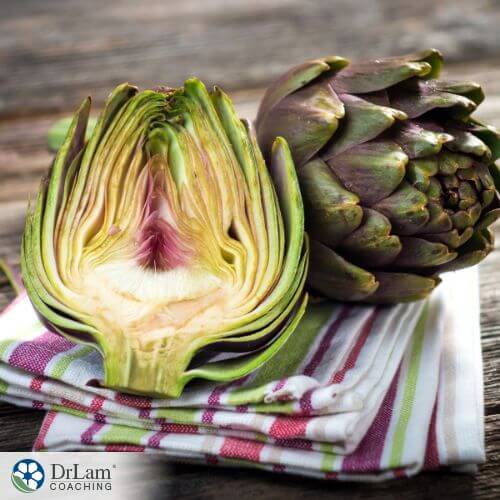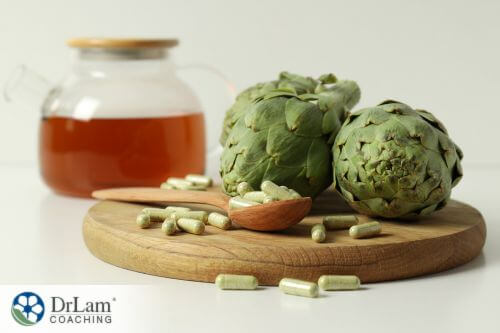 Artichoke has its origin in the Mediterranean region and is a form of thistle, although it’s often thought to be a vegetable. Cynara cardunculus var. scolymus, as they are scientifically called, are fiber-rich and contain potent antioxidants, along with other important nutrients. There are also reports of artichokes having several health benefits, from improving heart health to digestion, and they have been associated with medicinal properties for ages. Here are some artichoke benefits that could improve your health.
Artichoke has its origin in the Mediterranean region and is a form of thistle, although it’s often thought to be a vegetable. Cynara cardunculus var. scolymus, as they are scientifically called, are fiber-rich and contain potent antioxidants, along with other important nutrients. There are also reports of artichokes having several health benefits, from improving heart health to digestion, and they have been associated with medicinal properties for ages. Here are some artichoke benefits that could improve your health.
The green globe artichoke is the most common of the varieties out there. While there is no absolute definition of what constitutes a superfood, artichokes are commonly referred to as a superfood, partly because they have a high antioxidant content. They have 4.7 mmol of antioxidants per 100 grams and are particularly potent in chlorogenic acid, which is an antioxidant.
It’s among the oldest known Greek superfoods and has long been believed to have powerful medicinal properties. Artichoke benefits range from alleviating high blood pressure to reducing the risk of heart disease and stroke. Early research by the US Department of Agriculture established that artichokes were among the vegetables highest in antioxidants. This places it among the ranks of the superfoods, having a high concentration of antioxidants and vitamins with great nutritional value.
Artichoke benefits your health in part because of its anti-inflammatory effects. They contain plant compounds such as cynarin and silymarin that have anti-inflammatory properties.
These compounds work in two ways: one, by stopping the production of inflammatory mediators, and two, by decreasing the activity of inflammation-producing enzymes. If you consume artichokes regularly, it could reduce inflammation arising from digestive or liver issues.
Artichokes contain potent nutrients that are vital for your body’s overall health. They are low-calorie and low-fat plant-based foods that are not only antioxidant-rich, but packed with minerals, vitamins, and fiber. Also, artichokes are known for their high folate and vitamin C content, as well as vitamin K, which contributes to bone health. Furthermore, the minerals magnesium, phosphorus, and potassium are also present in artichokes. As a plant-based food, these thistles also contain above-average protein.
Artichokes may have a positive effect on your cholesterol levels. Studies indicate that artichokes may be beneficial in reducing LDL (bad) cholesterol levels, total cholesterol levels, and triglyceride levels. Furthermore, artichokes appear to contain the antioxidant luteolin, which stops cholesterol formation. Also, research suggests that artichokes aid the body in processing cholesterol with greater efficiency. As such, eating artichokes helps to reduce the risk of heart disease.
Adding artichoke to your diet may help decrease systolic and diastolic blood pressure in people with high blood pressure. Research indicated that artichoke leaf juice could help regulate your blood pressure if you experience mild high blood pressure. Early animal studies suggest that this is possible since artichoke contains the enzyme eNOS, which can widen your blood vessels. Also, potassium, which is present in artichokes, can help to regulate your blood pressure.
 Artichokes are not only known for their cholesterol-reducing capacity but also for blood-glucose-reducing effects and their capacity to repair impaired kidney function. Earlier studies indicate that artichokes can minimize both the creatinine and uric acid levels in hypercholesterolemia, which is associated with complications like impaired renal function.
Artichokes are not only known for their cholesterol-reducing capacity but also for blood-glucose-reducing effects and their capacity to repair impaired kidney function. Earlier studies indicate that artichokes can minimize both the creatinine and uric acid levels in hypercholesterolemia, which is associated with complications like impaired renal function.
Current animal research findings related to the protective effects of artichokes in kidney dysfunction due to a high-fat diet published in Archives of Physiology and Biochemistry found that artichoke leaf extract may produce positive kidney effects. Specifically, organ weight decreased significantly, along with kidney biomarkers, via a decrease in oxidative stress biomarkers. Further research is necessary to see how these findings translate to human subjects.
Artichoke may support liver protection and aid in the development of new liver tissue. The phytochemicals in artichokes act as antioxidants that provide protection against damage that results from oxidative stress. This may help prevent live damage.
Furthermore, artichokes increase bile production, which aids in the removal of harmful toxins that have accumulated in the liver. Also, studies suggest artichokes may help to reduce inflammation and liver cell death and improve liver function in people with non-alcoholic fatty liver disease.
Dr. Lam's Adrenal LiverCharge contains a powerful blend of Milk thistle, Dandelion root, and artichoke extract, meticulously crafted to enhance liver health through traditional herbal wisdom. These time-honored ingredients work harmoniously to promote optimal liver function, providing your body with natural cleansing support.
Artichokes have an ample amount of fiber which can help to support the health of your digestive system. Specifically, it contains the fiber inulin, which functions as a prebiotic. This helps it support friendly gut bacteria. Artichoke benefits also include minimizing the risk of developing particular bowel cancers and providing relief from constipation and diarrhea as well. Furthermore, this thistle can alleviate indigestion-related symptoms, including bloating, heartburn, and nausea. It may also help several digestive conditions.
Irritable bowel syndrome (IBS) is a health issue that impacts the digestive system. Its characteristic symptoms include cramping, bloating, flatulence, constipation, stomach pain, and diarrhea.
Artichokes may be able to relieve these symptoms, and research suggests they may work better than many common IBS medications, like antidiarrheals and laxatives. This artichoke benefit occurs because of particular compounds that it contains that may have antispasmodic properties. In other words, these compounds can stop muscle spasms that are a common symptom of IBS. Additionally, the prebiotics in artichokes could enhance the composition of your gut microbiome, supporting your gut health.
However, do note that artichokes are a high-FODMAP food, so if you are avoiding these hard-to-digest fibers for IBS reasons, you may want to avoid artichokes.
According to an article in the journal Molecules, leaky gut occurs when the intestinal wall becomes permeable, allowing harmful microorganisms, toxins, or undigested food particles to reach the bloodstream, where they can affect different systems in the body.
Artichokes may be good for leaky gut because it’s a nutrient-dense food, which the condition requires. Artichokes provide fiber and prebiotics, two of the key elements of the foods that you should eat with a leaky gut. These components help to feed good bacteria in the gut.
 Artichoke is referred to as a "mood food" in some arenas and has certain mental health benefits. It’s a good source of the nutrient magnesium, which has been shown to assist in calming the mind during stressful times or when feeling anxious. Also, it contains the B vitamin folate which is linked to a boost in neurotransmitter function, which in turn, boosts focus and minimizes stress. Furthermore, it’s a good source of vitamin C and K, which function as antioxidants in the brain, where they reduce neuroinflammation that can cause symptoms of anxiety.
Artichoke is referred to as a "mood food" in some arenas and has certain mental health benefits. It’s a good source of the nutrient magnesium, which has been shown to assist in calming the mind during stressful times or when feeling anxious. Also, it contains the B vitamin folate which is linked to a boost in neurotransmitter function, which in turn, boosts focus and minimizes stress. Furthermore, it’s a good source of vitamin C and K, which function as antioxidants in the brain, where they reduce neuroinflammation that can cause symptoms of anxiety.
Artichoke benefits also extend to reducing your blood sugar levels. Some early evidence suggests that due to the antioxidant effects of certain compounds that are present in artichoke, it may minimize blood sugar along with improving cholesterol and triglyceride levels in the body. Still, further research is necessary to substantiate these claims.
Studies supporting the anticancer effects of artichokes are few. However, findings from animal studies suggest that it might impair cancer cell growth. Artichokes contain certain antioxidants like gallic acid, quercetin, rutin, and silymarin that some believe to have anticancer effects. For instance, in animal studies, the antioxidant silymarin appears to help prevent and remedy skin cancer. However, studies on humans are necessary to arrive at solid conclusions about artichoke benefits and human health.
Many of the above conditions can be traced back to chronic stress, a common problem in today's world. And chronic stress often leads to adrenal fatigue. Adrenal Fatigue Syndrome (AFS) is the non-Addison’s form of adrenal dysfunction, a condition where the body’s stress response cannot keep up with life’s chronic stressors. Stress triggers the adrenal glands to produce the stress hormone cortisol. However, over a longer time period, the body can struggle to produce enough cortisol and other hormones to meet the demand. As a result, this can cause an imbalance in the NeuroEndoMetabolic (NEM) Stress Response system, a system spanning several organs and systems that the body uses to manage stressors.
Managing AFS begins with eating healthy and getting active. The above artichoke benefits may help with certain symptoms of the condition. Anxiety, IBS, and other gut problems are symptoms associated with AFS that artichokes may help to alleviate. The antioxidant, anti-inflammatory, and nutrient-packed capacity of this superfood makes it a good option to add to your AFS diet. However, be sure to talk to your doctor about how to incorporate it into your diet plan if you have AFS.
Anyone who is allergic to artichokes should avoid eating them. The same goes for people with IBS and who are avoiding foods containing FODMAP (fermentable oligosaccharides, disaccharides, monosaccharides, and polyols). These are a group of short-chain sugars that the small intestine does a poor job of absorbing. This can lead to unwanted gut symptoms in some people. The compound inulin that is present in artichoke is high FODMAP.
Furthermore, anyone who has a ragweed allergy or related plant allergic reaction should also avoid artichokes. People who are sensitive to plants from the Asteraceae/Compositae family (e.g. chrysanthemums, daisies, marigolds) may develop an allergic reaction to artichokes.
 Research indicates that, when taken by mouth as medicine, artichokes are possibly safe for up to 12 weeks. There is a lack of information to determine if it’s safe for pregnant and breastfeeding women as well. Some people may experience diarrhea, gas, or upset stomach when they eat artichokes, and it might also cause allergic reactions.
Research indicates that, when taken by mouth as medicine, artichokes are possibly safe for up to 12 weeks. There is a lack of information to determine if it’s safe for pregnant and breastfeeding women as well. Some people may experience diarrhea, gas, or upset stomach when they eat artichokes, and it might also cause allergic reactions.
Furthermore, if you suffer from gallstones or bile duct obstruction, artichokes might worsen the condition by increasing bile flow. Be sure to talk with your doctor before adding artichokes to your diet if this is a problem for you.
When it comes to diet, it’s best to eat even nutritious foods in moderation. This is because, while they may be good for you, many foods contain small amounts of toxic compounds that can be problematic if you are consuming huge quantities. Artichokes are no different, with trace amounts of the toxic compound solanine, which can cause the development of joint pain, arthritis, and extended inflammation.
Also, if you experience gas, diarrhea, upset stomach, or other stomach issues when you eat artichokes, it wouldn’t be good to add them to your diet every day.
However, for everyone else, eating artichokes every day might be okay since it’s a healthy food option that is low in calories, and high in antioxidants, fiber, minerals, and vitamins. The key is maintaining a balanced diet with adequate nutritional intake. For men, the recommended daily amount of artichokes is anywhere from 30 and 38 grams, while it’s between 21 and 25 grams daily for women.
Aside from medical reasons, sometimes your artichokes have just gone bad. There are a few indications that your artichokes may not be their best for consumption. When the freshness has waned, the leaves may turn black or brown. Your artichokes are no longer fit for eating when their leaves or stems feel slimy or slippery when you touch them. Additionally, if they have a strong unpleasant odor and lack an earthy smell, it’s a sign that you should discard them.
Artichoke benefits make this superfood a great addition to most diets. It can help with anxiety, liver and kidney health, blood sugar, digestive health, and hypertension regulation, among other benefits. You may be missing out on a powerful, nutrient-dense food. Could artichokes help boost your health and well-being today?
If you would like to add artichokes to your AFS diet, the team at Dr. Lam Coaching can assist you in making an informed decision. We’ll guide you on how to incorporate them into your diet for maximum benefit that can help to improve your condition.
Aleman, Ricardo Santos, et al. “Leaky Gut and the Ingredients That Help Treat It: A Review.” Molecules. (Basel, Switzerland) vol. 28,2 619. 7 Jan. 2023, doi:10.3390/molecules28020619 https://pubmed.ncbi.nlm.nih.gov/36677677/
Ben Salem, Maryem, et al. “LC-MS/MS Analysis and Hepatoprotective Activity of Artichoke (Cynara scolymus L.) Leaves Extract against High Fat Diet-Induced Obesity in Rats.” BioMed Research International. vol. 2019 4851279. 23 May. 2019, doi:10.1155/2019/4851279 https://www.ncbi.nlm.nih.gov/pmc/articles/PMC6556340/
Ben Salem, Maryem, et al. “Preventive effect of Artichoke (Cynara scolymus L.) in kidney dysfunction against high fat-diet induced obesity in rats.” Archives of Physiology and Biochemistry. vol. 128,3 (2022): 586-592. doi:10.1080/13813455.2019.1703755 https://www.tandfonline.com/doi/abs/10.1080/13813455.2019.1703755
Some artichoke benefits that you should be aware of include its anti-cancer effects, its capacity to boost kidney and liver health, its ability to regulate blood pressure, reduce cholesterol and blood sugar levels, and support digestive health. Artichokes may also help improve IBS.